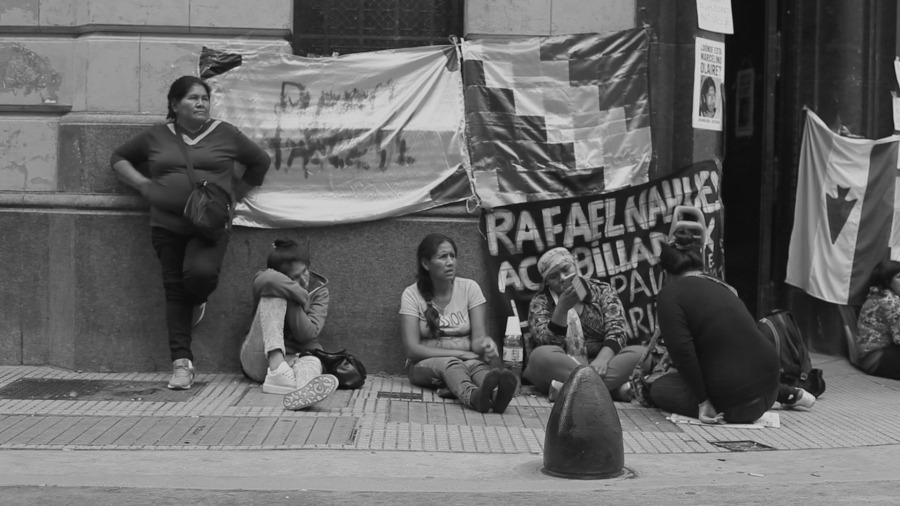Director María Laura Vásquez presented the documentary “La rebelión de las flores”, the stories of 23 indigenous women who defend their territories and refuse to silence their voices.
By Leandro Albani for The Ink
How far does racism go in Argentina? In what depths is that system of thought rooted that goes back to the founding of the Republic? Is there in the country the real and concrete possibility that the Argentine State, once and for all, respect the rights of the original peoples?
The answers to these questions can be found in the documentary The rebellion of the flowerswhich premiered last week in Buenos Aires and is directed by director María Laura Vásquez.
How does the director come to reveal those answers for those who want to see and hear them? With a delicate, visually exquisite film that allows you to feel the voices of women from all over the country, including Moira Millán’s.
Shock and emotion, anger and hope, constant questions to the viewers support a documentary of one hour and twenty minutes that is watched almost without blinking, not only because of its political weight, but also –and this is fundamental- because of a direct montage full of landscapes from Puelmapu, the Mapuche region on this side of the mountain range, which transmit every vibration of a territory systematically denied to its original inhabitants.
For five years, Vásquez filmed, spoke, listened, dialogued with indigenous women who, tired of official silence, in October 2019, carried out a peaceful occupation for 11 days of the Ministry of the Interior, administered by Rogelio Frigerio during the government of Mauricio Macri. . 23 women confronted the Argentine State. 23 women who, with a handful of demands and claims, exposed the policy of denial displayed by a ruling political class that, barely two centuries ago, could be the same liberals who wanted a “new Europe” from the country.
In The rebellion of the flowers, is denounced, but –more importantly- it shows the possibility of other forms of life, of community coexistence and construction that are in the deep roots of the territory. In the persistence of the 23 indigenous women who refuse to disappear in the face of the State’s indifference, their feelings and daily realities, their vulnerabilities, the strengths that they care for from their ancestry and spirituality materialize. In front of them, in this case, Rogelio Frigerio, the bureaucratic representation of the Nation-State.
Almost without support, alone, leaving sons and daughters in their communities, the women who live The rebellion of the flowers they achieve one of their objectives: to meet with the Minister of the Interior. Vásquez’s camera accompanies them, films that meeting, reveals Frigerio’s bureaucratic coldness: while the women talk, the then minister looks at his watch, tries to yawn surreptitiously, repeats over and over “I can’t do anything” and, as corollary, he ends the meeting with a strong blow on the table he presides over. In that sequence, racism – which few people want to talk about in Argentina today – is portrayed for history.
Vásquez has a long history in documentary filmmaking. She graduated from the International School of Film and Television of San Antonio de Los Baños, in Cuba, she made more than 20 productions, among which stand out When the compass pointed south (2008), Independence project, the libertarian spirit of a people (2011) and The 120. The Coffee Brigade (2018). These days, the director is already embarking on a new project: a documentary that tells the story of the Argentine doctor Alina Sánchez (Lêgerîn Çiya), who died in 2018 in Rojava (Syrian Kurdistan), where she had found the place of militancy of she.
In The rebellion of the flowers, Vásquez synthesizes the best school of Argentine political cinema, but also allows us to discover the intimacy of women who represent a fight against colonization of more than 500 years. All this with simple images full of life. In the documentary, the presence of a recording camera disappears in the first few minutes of projection. The camera, like those women, their sons and daughters, their rivers, valleys, flowers and trees, are already the same territory.
Performances in October at the San Martín Cultural Center (Sarmiento 1551, CABA)
Thursday 6, 7 p.m. / Friday 14, 7 p.m. / Sunday 16, 7 p.m. / Saturday 22, 7 p.m. / Sunday 23, 5 p.m. / Saturday 29, 7 p.m. / Sunday 30, 5 p.m.
*By Leandro Albani for La Tinta / Cover photo: A/D.
Comments
23 voices of women who denounce racism against indigenous peoples | The ink

